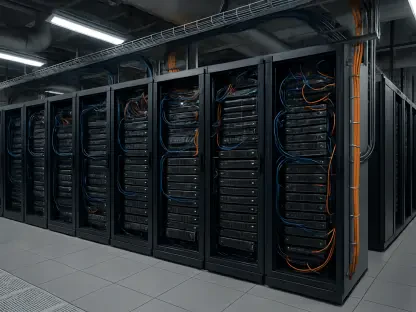The recent disclosure of several high-severity vulnerabilities in VMware’s cloud management platform, VMware Aria, underscores the relentless challenges in maintaining cybersecurity in modern IT environments. VMware Aria, integral to seamless cloud operations for many enterprises, was found to have multiple security flaws, igniting concerns regarding sensitive credential exposure. Parent company Broadcom has been swift to release patches, ensuring users are informed and primed to safeguard their systems.
Urgency of Addressing High-Severity Vulnerabilities
Information Disclosure Flaws: CVE-2025-22218 and CVE-2025-22222
The high-severity vulnerabilities in VMware Aria Operations and VMware Aria Operations for Logs, classified under CVE-2025-22218 and CVE-2025-22222, accentuate the risk landscape for IT administrations. CVE-2025-22218 allows malicious actors with View Only Admin permissions to exfiltrate credentials associated with VMware products integrated with VMware Aria Operations for Logs, showcasing its criticality with a CVSS score of 8.5 out of 10. Such vulnerabilities highlight the ease with which limited-permission users can potentially escalate threats by merely viewing sensitive data.
On the other hand, CVE-2025-22222 enables non-administrative users, who possess valid service credential IDs, to retrieve outbound plugin credentials. Rated at 7.7 out of 10, this vulnerability emphasizes the broader scope of risks posed by entities normally considered lower-priority in threat assessment. These vulnerabilities are a stark reminder that even seemingly segmented permissions can result in significant breaches if exploited. The need for comprehensive attention to all possible user actions within integrated systems cannot be overstated.
Impact on VMware Cloud Foundation
The vulnerabilities extend beyond standalone systems, impacting VMware Cloud Foundation (VCF) due to its close integration with VMware Aria for operational insights. The inclusion of affected versions VMware Aria Operations for Logs v8.x, VMware Aria Operations v8.x, and VCF versions 5.x and 4.x in this advisory intensifies the urgency to apply updates. Updates released as VMware Aria Operations v8.18.3 and VMware Aria Operations for Logs v8.18.3 are pivotal in mitigating these vulnerabilities, prompting users to follow guidance found in KB92148 comprehensively.
Despite the robust security measures often associated with hybrid cloud infrastructures like VCF, no system remains impervious to evolving threats. The disclosed vulnerabilities demonstrate the inherent risks in interconnected environments, where an overlooked exploit in one component can cascade repercussions throughout an organization’s entire cloud infrastructure. Prompt patching and adherence to the recommended updates are not mere suggestions but essential actions to maintain operational security integrity.
Addressing Broader Security Concerns
Cross-Site Scripting and Escalation Flaws
In addition to the primary vulnerabilities, VMware Aria’s security advisory also pointed out other notable flaws, including a stored cross-site scripting (XSS) vulnerability, identified as CVE-2025-22219. This flaw, rated with a CVSS score of 6.8 out of 10, exposes the system to potential risks where malicious scripts could be executed within victims’ browsers. This stored XSS vulnerability highlights the persistent risk web-based interfaces and applications face, as attackers look to leverage script execution to compromise data integrity and user privacy.
Furthermore, the identified privilege escalation vulnerability, CVE-2025-22220, carries a CVSS rating of 4.3 out of 10 and could offer attackers increased access capabilities. Such privilege escalation flaws serve as critical reminders of the multifaceted approaches attackers might employ to incrementally extend their reach within targeted systems. Ensuring that these vulnerabilities are patched alongside more severe flaws is equally imperative to maintain holistic system security.
Moderate Severity Concerns and Patching
An additional XSS vulnerability designated CVE-2025-22221, which has a moderate severity rating of 5.2 out of 10, signifies that even less critical vulnerabilities can have substantial impacts if neglected. This particular flaw demonstrates that an actor with admin privileges could exploit it to execute malicious scripts, underscoring that administrative oversight is paramount in mitigating such risks. Often, moderate vulnerabilities might be deprioritized, but their potential for exploitation in combination with other flaws can result in significant security breaches.
Broadcom emphasized the non-availability of workarounds for these vulnerabilities, stressing the importance of applying the released patches immediately. The cohesive strategy in patch implementation reflects both VMware and Broadcom’s commitment to robust cybersecurity practices. The rapid response to address these vulnerabilities showcases a proactive stance against potential threats poised to exploit any delay in patch deployment.
Moving Forward with Firm Security Measures
The recent revelation of several high-severity vulnerabilities in VMware’s cloud management platform, VMware Aria, highlights the ongoing challenges in maintaining cybersecurity in modern IT environments. VMware Aria, essential for seamless cloud operations for numerous enterprises, was found to have several security flaws. These flaws have sparked serious concerns about the potential exposure of sensitive credentials. In response, Broadcom, VMware’s parent company, has acted swiftly to roll out patches, ensuring that users are promptly informed and equipped to protect their systems. This incident underscores the critical importance of proactive security measures and rapid responses in safeguarding digital infrastructure. Ensuring that updates and patches are applied quickly is vital in mitigating the risks associated with such vulnerabilities. For enterprises relying heavily on cloud services, staying vigilant and up-to-date with the latest security measures is not optional but necessary to maintain the integrity of their operations.









